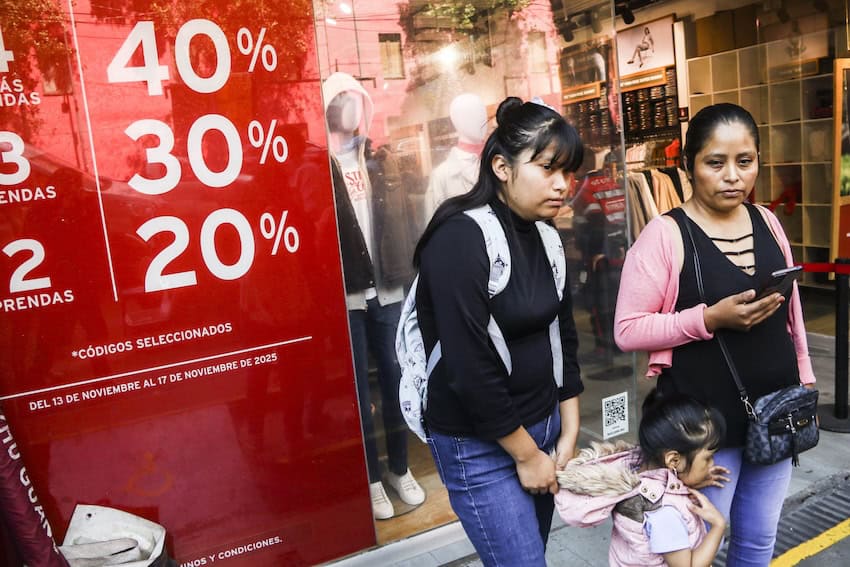Mexico navigated a busy week marked by dramatic security achievements, international cooperation, economic challenges and political tensions. From coordinated anti-cartel operations to archaeological discoveries, the Nov. 10-14 period saw the Sheinbaum administration tout crime reductions while confronting business slowdowns, infrastructure issues and bilateral friction with the United States.
Didn’t have time to read this week’s top stories? Here’s what you missed.
Security successes amid ongoing challenges
President Sheinbaum started the week with the announcement that it would deploy nearly 2,000 additional troops to Michoacán as part of the Plan Michoacán for Peace and Justice, a comprehensive 57-billion-peso ($3.1 billion) initiative to pacify one of Mexico’s most violent states. The 12-point strategy also includes economic development, infrastructure projects, education improvements and support for farmers. Notably, Sheinbaum emphasized that unlike former President Calderón’s militarized approach, “peace is not imposed with force.”
On Tuesday, Federal Security Minister Omar García Harfuch revealed that 56% of extortion telephone lines traced through the government’s 089 hotline originated from just 12 prisons, prompting plans to block cell phone signals at 14 federal prisons and 13 Mexico City prisons by early 2026. Meanwhile, it came out that a suspect in the murder of Uruapan’s mayor had already been arrested when he was killed, raising questions about why a municipal police officer killed someone who was no longer a threat — and may have been able to provide information about the conspirators behind the crime.
The Sheinbaum administration highlighted significant progress in reducing violence. At Tuesday’s morning press conference, officials reported homicides declined 27.9% in 2025 compared to 2024, with an average of 66.1 murders per day in the first 10 months. October saw particularly dramatic improvement, with 32 fewer daily homicides than September 2024. García Harfuch attributed the decline to 37,000 arrests over 13 months, along with seizures of nearly 300 tonnes of drugs and nearly 19,000 firearms.
However, grim discoveries tempered these achievements. Authorities announced the remains of 16 people were found in a clandestine cemetery near Cancún, a rare occurrence for the Caribbean coast tourism destination.
Following Mexico’s lead, US sanctions cartel-linked casinos across Mexico
The week also saw unprecedented U.S.-Mexico cooperation. The two countries coordinated operations to shut down cartel-linked gambling establishments suspected of money laundering for the Sinaloa Cartel. After Mexico announced closing 13 casinos Tuesday, the U.S. Treasury sanctioned 10 Mexico-based establishments, including casinos in Ensenada, Villahermosa, Nogales and Mazatlán. The coordinated action targeted the Hysa Organized Crime Group, an Albanian family accused of laundering drug trafficking proceeds.
International drug trafficking cooperation expanded further. China announced new restrictions requiring export licenses for 13 fentanyl precursor chemicals destined for Mexico, the United States and Canada, taking effect immediately on Monday. FBI Director Kash Patel credited the policy change to President Trump’s engagement with Chinese President Xi Jinping. Separately, Mexico and France announced joint efforts to tackle organized crime.
Despite cooperation, tensions over potential U.S. military intervention surfaced. However, U.S. Secretary of State Marco Rubio clarified Thursday that America will not undertake unilateral military action against Mexican cartels, appearing to quell recent media reports of imminent operations.
Political developments and controversies
President Sheinbaum confronted multiple political challenges this week. At Thursday’s press conference, she forcefully addressed opposition claims that her recent sexual assault was staged, describing such statements as “revictimization” rooted in misogyny. She also defended references to former President Calderón’s role in current security problems, stating “we must always remember history.”
The next day, Sheinbaum announced that a proposal to reduce Mexico’s workweek from 48 to 40 hours could be presented to Congress this month.
Meanwhile, billionaire Ricardo Salinas Pliego met with El Salvador’s President Bukele Wednesday, suggesting Mexico needs a “tough on crime” leader. Awkwardly, Mexico’s Supreme Court ruled the next day that Salinas must pay over 48 billion pesos ($2.6 billion) in a massive tax evasion case.
Economic indicators paint a mixed picture

While the long weekend shopping extravaganza El Buen Fin launched Thursday expecting to generate over 200 billion pesos ($10.9 billion) in sales, deeper concerns emerged. Industrial activity declined 1.8% in the first nine months of 2025, the worst performance since 2009 excluding the pandemic. Construction declined 2.7% annually, with civil engineering projects plummeting 26.7% due to reduced government infrastructure spending. Manufacturing fell 0.5%, with transport equipment production down 4.9%. The telecom sector is also set to lose a major player, after Movistar announced its exit from the Mexican market.
Yet growth pockets remained visible. International visitation increased 13.9% in the first nine months, with 71 million total visitors generating $25.7 billion. At Wednesday’s press conference, Sheinbaum celebrated record formal sector employment. And earlier in the week at Monday’s FIFA briefing, she fielded questions about 2026 World Cup security and tickets. The event is expected to generate an economic windfall, especially for the Mexican host cities: Mexico City, Guadalajara and Monterrey. Meanwhile, daily production at the Dos Bocas refinery surged 87% in September.
Investment news offered tentative optimism. BYD signaled renewed interest in building a Mexican plant. The Mexican company Cipre Holding also shared news of plans for a US $1 billion data center in Nuevo León (an announcement that was partially overshadowed when the state governor mistakenly credited and thanked Nvidia for the investment, which they denied).
Technology developments continued with Jalisco announcing a new semiconductor chip design park, even as the U.S. semiconductor industry urged the USMCA free trade treaty partners to excempt their industry from tariffs.
A different industry faced new tariffs, this time implemented by Mexico. In response to domestic oversupply, the government announced tariffs of up to 210% on sugar imports.
Infrastructure and social developments
Infrastructure showed progress despite constraints. Work began on a new highway connecting San Luis Potosí with Querétaro. Nayarit authorities announced recovering $2.7 billion in beachfront land illegally sold during previous administrations.
The weather cooled down, and a cold front prompted schools in Puebla and Hidalgo to close on Monday. Then Thursday night, another cold front swept across Mexico, bringing temperatures to -10°C in mountainous areas with heavy rains forecast.
Nayarit authorities reclaim US $2.7B in stolen beachfront land
Cross-border tensions emerged as U.S. senators pushed legislation to block water deliveries to Mexico over the 1944 treaty.
Archaeological discovery
Archaeologists announced discovering a massive 3,000-year-old map of the Maya universe in Tabasco. The Aguada Fénix site, built between 1050 and 700 B.C.E., covers an area comparable to Cincinnati, making it the oldest and largest monumental architecture in the Maya world. Unlike pyramid-building kingdoms, it shows no signs of rulers, suggesting voluntary communal construction.
Looking ahead
Several key issues demand attention. Past 40-hour workweek proposals have repeatedly failed, and Sheinbaum’s new attempt will require delicate negotiations over the course of the next month. Whether China’s fentanyl precursor restrictions keep the chemicals out of the hands of traffickers remains to be seen, and Mexico has its work cut out to keep homicide levels trending down.
President Sheinbaum’s ability to navigate criticism while maintaining focus on security, addressing an industrial slowdown and tackling social issues will shape Mexico’s trajectory approaching the World Cup and could position the country for continued growth despite trade tensions and domestic challenges.
This story contains summaries of original Mexico News Daily articles. The summaries were generated by Claude, then revised and fact-checked by a Mexico News Daily staff editor.
